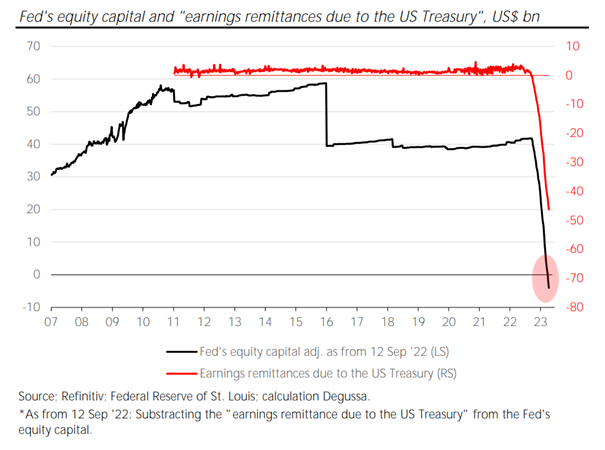Category Archive: 6b.) Mises.org
Are Libertarians Abandoning Free Trade?
A bedrock of Austrian economics and libertarianism has been free trade. Unfortunately, some people who claim to value liberty no longer value unhampered exchange.
Original Article: "Are Libertarians Abandoning Free Trade?"
Read More »
Read More »
Socialism, Minority Groups, and Personal Liberties
Socialists have managed to acquire the loyalty of a coalition of disparate groups by championing the principle of personal liberty. Especially in the United States, many women, disabled, gay people, transgender people, racial and ethnic minorities, and immigrants are among the proud supporters of the socialist cause, foolishly believing that capitalism or the free market is antithetical to their livelihood or lifestyles.
They could not be more...
Read More »
Read More »
The Ruling Classes Are Inflation Deniers and the Ship of Fools Sails On
Even after two years of "transitory" inflation, America's ruling classes insist that prices are falling and that all of this is temporary. We don't believe them.
Original Article: "The Ruling Classes Are Inflation Deniers and the Ship of Fools Sails On"
Read More »
Read More »
The New Immigration Bill Is a Trojan Horse for E-Verify and Is a Threat to All Americans
Members of the U.S. House of Representatives are set to vote this week on new legislation that would greatly increase the federal government's power over private businesses, workers, and US citizens. Unfortunately, much of the GOP majority is supportive of the legislation—the “Border Security and Enforcement Act of 2023” (HR 2640)—because it is being marketed as a bill "to secure the border."
Much of the bill contains reasonable...
Read More »
Read More »
Did Tucker’s Last Major Guest Lead to His Firing?
Speculation is still swirling about why Tucker Carlson was cancelled by Fox News. The major mainstream outlets have credited his dismissal to a few leaked text messages and video footage revealing Carlson making “crude and offensive” comments off air. Some outlets pointed to the lawsuit brought against Fox and Carlson by Abby Grossberg. Still others claim that the Dominion Voting defamation suit was the impetus for the ouster. I have given a...
Read More »
Read More »
Comprehensive Reform versus Piecemeal Reform
In the previous two articles in this three-part series on bipartisan comprehensive political reform, we dealt with the excuses for extortion and evasion such claims for reform provide and with the fact that such claims often lead to more comprehensive ignorance being applied to social problems. Now, we turn to the question of comprehensive reform versus piecemeal reform.
When it comes to bipartisan comprehensive political reform, beyond its...
Read More »
Read More »
The Fed Is Overindebted, Isn’t It?
Behind closed doors, the report is already making the rounds in expert circles: if you follow the rules of sound commercial accounting, the United States Federal Reserve (Fed) has lost its equity and is, as common language would have it, bankrupt. What happened?
During spring 2020 (i.e., in a period of extremely low interest rates), the Fed purchased large amounts of government bonds and mortgage bonds to support the economy and financial markets...
Read More »
Read More »
The Income Tax: Lessons from the Sixteenth Amendment
The passage of an income tax in the early twentieth century was an enormous shift toward a far more centralized and powerful US state.
Original Article: "The Income Tax: Lessons from the Sixteenth Amendment"
Read More »
Read More »
Prevent Future Losses Like East Palestine by Reducing Regulation and Empowering Torts
To prevent rail accidents like the one in East Palestine, dial back government regulation and allow the tort system to work.
Original Article: "Prevent Future Losses Like East Palestine by Reducing Regulation and Empowering Torts"
Read More »
Read More »
Was Japanese Colonialism the Engine of Later Prosperity for Korea and Taiwan? Probably Not
Mainstream historians attribute the postwar economic success of South Korea and Taiwan to the legacy of Japanese colonialism. The Japanese are credited with providing new technologies, critical infrastructure, and an efficient state that enabled industrial progress in South Korea and Taiwan. Both Taiwan and Korea benefitted from the successful adoption of Japanese technologies and recorded industrial growth under imperial rule.
Moreover, during...
Read More »
Read More »
Disinformation and the State: The Aptly Named RESTRICT Act
Federal laws with acronyms are usually bad news. (Think the USA PATRIOT Act.) The RESTRICT Act is yet another Orwellian proposal in which the federal government assumes ignorance is strength.
Original Article: "Disinformation and the State: The Aptly Named RESTRICT Act"
Read More »
Read More »
Lincoln’s Main Target Was “Anarchy” and Secession, Not Slavery
Once the Southern states accepted the Thirteenth Amendment, Lincoln was entirely content for the old Southern elites to resume their positions of power and for many blacks to continue in a condition little better than bondage.
Original Article: "Lincoln's Main Target Was "Anarchy" and Secession, Not Slavery"
Read More »
Read More »
A Pyrrhic End to 130 Years of Vicious Bad Money and Banking Crises
The current banking crises have deep roots in US financial history. Monetary authorities have engaged in inflationary behavior for more than a hundred years.
Original Article: "A Pyrrhic End to 130 Years of Vicious Bad Money and Banking Crises"
Read More »
Read More »
Bank Reserves
Bank reserves are seldom mentioned except in cases of bank runs. The other possible mention is all the interest money the Fed pays to banks simply for holding reserves. Mark explains the role of bank reserves in the current "system" and gives a brief explanation of why the Austrian view is better and actually gets the job done.
Be sure to follow Minor Issues at Mises.org/MinorIssues.
Read More »
Read More »
The Progressive Era and the Family
[Originally from Joseph R. Peden and Fred R. Glahe, eds., The American Family and the State (San Francisco: Pacific Research Institute, 1986).]
While the "Progressive Era" used to be narrowly designated as the period 1900–1914, historians now realize that the period is really much broader, stretching from the latter decades of the nineteenth century into the early 1920s. The broader period marks an era in which the entire American...
Read More »
Read More »
Argentina Sleepwalks into Hyperinflation (Yet Again)
The Argentine peso has lost half its value in one year. Both the official and parallel exchange rates with the US dollar and the Mexican peso have doubled in one year. Consumer prices have doubled in one year. The quantity of Argentine pesos has doubled in one year. All the rates at which these variables are increasing have also doubled in one year. Expecting everything to double again in half a year is now a conservative projection.
Argentina was...
Read More »
Read More »
A Credit Crunch Is Inevitable
Federal Reserve data shows $98 billion of deposits left the banking system in the week after the Silicon Valley Bank collapse. Most of the money went to money-market funds, as the Bloomberg data shows that assets in this class rose by $121 billion in the same period. The data shows the challenges of the banking system in the middle of a confidence crisis.
However, as many analysts point out, this is not necessarily the main factor that dictates the...
Read More »
Read More »
Washington Has No Moral Authority to Ban Guns
After the hate crime against Christians perpetrated by a transgender shooter in Nashville in March 2023, there was the usual outcry to ban firearms.
Days after the killing spree, activists staged an insurrection at the Tennessee State Capitol calling for tougher gun laws. This despite the fact that many in favor of gun control politicized the violence and called for more of it.
However, the most jarring of all the gun-ban reactions to the Nashville...
Read More »
Read More »
The Economics of Arts and Culture
Both artists and athletes perform for others. When governments get involved it either is for subsidies or censorship. Neither is satisfactory.
Original Article: "The Economics of Arts and Culture"
Read More »
Read More »
Can Supercomputers Make Socialism Work?
Jonathan Newman joins Bob to critique a recent Twitter argument where some were claiming that supercomputers solved the socialist calculation problem.
The Twitter thread on AI and Socialism: Mises.org/HAP394a
Bob on Socialism and calculation vs knowledge: Mises.org/HAP394b
Karras Lambert and Tate Fegley on economic calculation and AI: Mises.org/HAP394c
[embedded content]
Read More »
Read More »


























